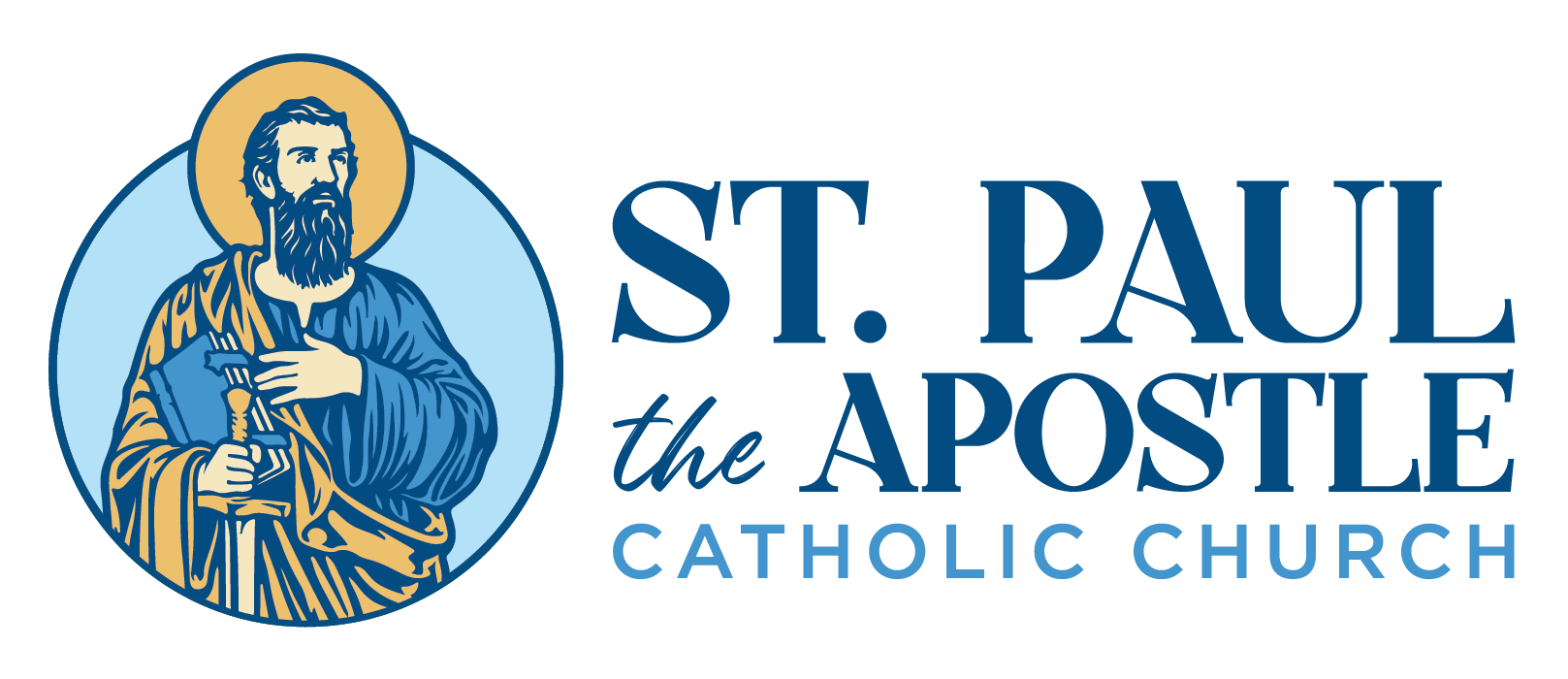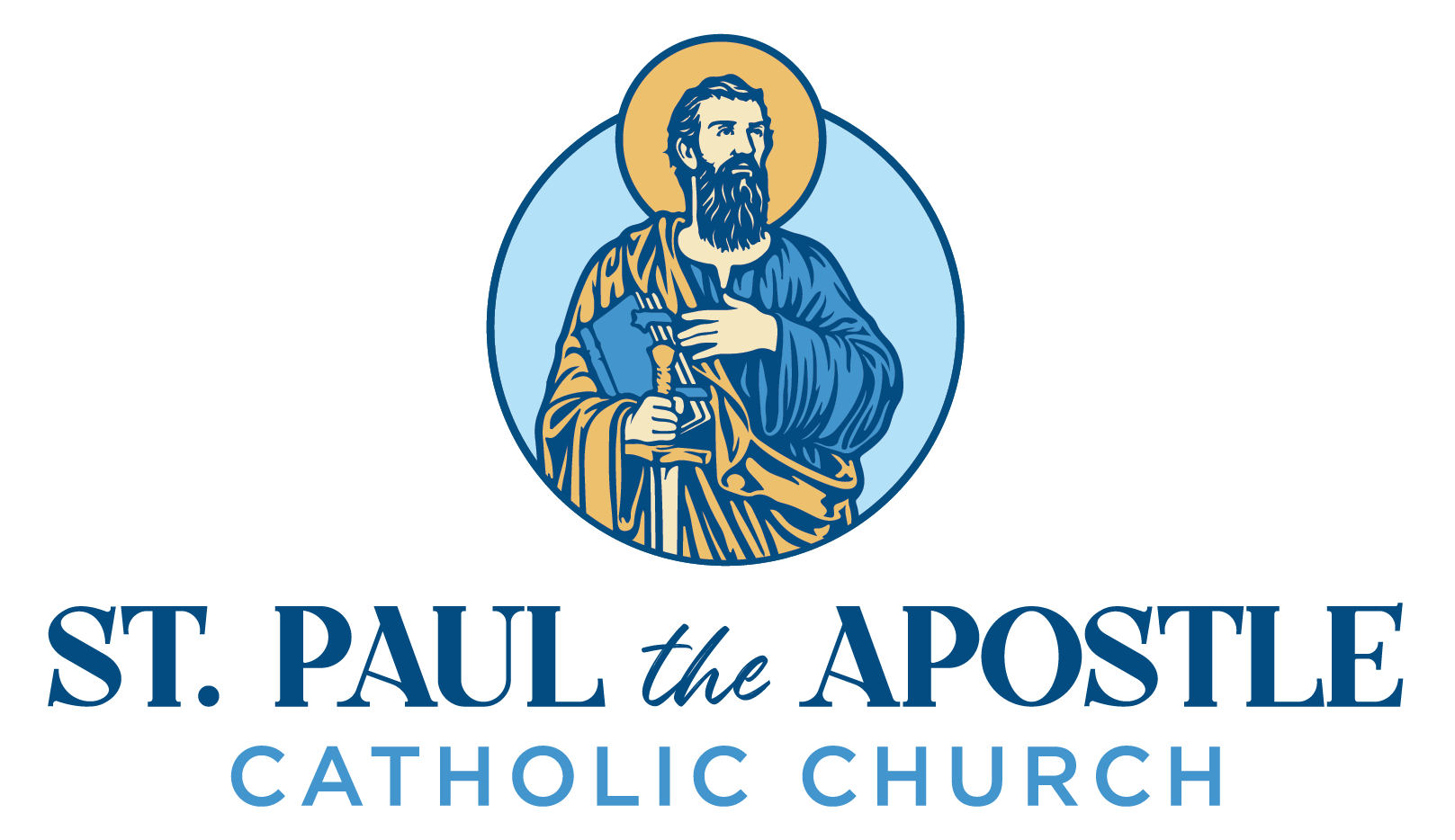introduction
Planning or Pre-Planning a Funeral Mass at St. Paul
After reviewing the introductory video and information below, use the button below to hear and examine the lyrics of the music selections found in the planning booklet.
-
Why do we celebrate a funeral Mass?
The center of the Order of Christian Funerals is The Funeral Mass. “At the funeral Mass the community gathers with the family and friends of the deceased to give praise and thanks to God for Christ’s victory over sin and death, to commend the deceased to God’s tender mercy and compassion, and to seek strength in the proclamation of the paschal mystery.” (OCF 129) The clear focus in the funeral liturgy is not to keep alive the memory of the deceased but rather God’s abiding presence and the wonders of his grace in the saving death and resurrection of Jesus, in which we participate through our baptism and lives of discipleship. Perhaps more than any other rite, this liturgy distinguishes our Roman Catholic tradition from other common funeral practices.
It begins recalling our baptism, when we first shared Christ’s victory over sin and death, as the casket is blessed with holy water and clothed with a white garment (the pall) and then placed by the Easter Candle near the altar. As we celebrate the Word of God as at every Mass, the homily follows. The homily “should dwell on God’s compassionate love and on the paschal mystery of the Lord, as proclaimed in the Scripture readings. The homilist should also help the members of the assembly to understand that the mystery of God’s love and the mystery of Jesus’ victorious death and resurrection were present in the life and death of the deceased” and in our present lives as well. (OCF 27) Hence the homily is never to be a eulogy. Mass continues in the usual way until after communion, when the prayers of Final Commendation and Farewell concludes the Mass, followed by the procession to the place of burial.
The Rite of Committal brings to conclusion the funeral rites at the grave, tomb or crematorium. These brief prayers may be led by a priest, deacon or a lay minister or by a member of the family.
-
Why are we encouraged to pray for the dead?
“At the death of a Christian, whose life of faith was begun in the waters of baptism and strengthened at the eucharistic table, the Church intercedes on behalf of the deceased because of its confident belief that death is not the end nor does it break the bonds forged in life.” (OCF 4) The dead need our prayers as we pray for God’s mercy and petition His forgiveness for all of their sins. In addition, our prayers for the dead remind us that we are not separated from them as it strengthens our communion with all the saints. Such prayer is also beneficial to us as we prepare for our own passing from this life to the next. We pray for the dead not only in our own personal prayers but also through Mass offerings. There we join in the celebration of Christ’s death and resurrection and our desire and hope to share His victory with all those who have died in the same faith of Jesus Christ. The Church has the annual celebration of All Souls Day every November 2 to commemorate all the faithful departed. Many parishes offer a special Mass on or around this day to especially remember those buried from the parish during the past year. Masses for the deceased on the anniversary of their death, their birthday or other days are another way to offer our prayers for the dead. The Mass may also operate spiritual transformations in members of the congregation: they renew a perspective of life, move closer to God and increase their spirituality.
-
Why is there no eulogy?
The Catholic Funeral Mass does not have a eulogy because the mourners gather to praise God Himself, not the defunct, to pray for the deceased to reach eternal repose, and to join the Redeemer in the offering of Himself to our Heavenly Father. The Catholic Church claims that the wake (or at the luncheon/reception following) is the appropriate forum for reminiscing and sharing on the person’s life, because a eulogy is not liturgical.
-
First Steps and Information
Please pick up a planning booklet from the church. For planning purposes, the booklet contains all of the permitted options for the Scripture readings and intercessory prayers and appropriate music. Funeral Masses may be offered on any day except for solemnities that are Holy Days of Obligation, Thursday of Holy Week or during the Paschal Triduum (from the evening Mass of the Lord’s Supper through Good Friday through Easter Sunday. Also, due to the existing schedule at St. Paul’s, Sundays and Tuesdays are not available as days for Funeral Masses. Due to Weddings and other functions that typically occur on Saturdays, it is normally a day that funeral Masses are not celebrated except for occasions of special hardship and with granting of permission from the Pastor and/or Director of Liturgy. Generally speaking, the Funeral Mass will begin at 11:00a.m. There is a “Planning sheet” in the booklet for you to record your selections.
Also, the family is invited to choose appropriate music for the Mass (Opening Hymn, Offertory Hymn, Communion Hymn and Closing Hymn). Note that these may only be chosen from music specifically written for use during the Mass, i.e., no secular music of any kind. A member of the Funeral Planning Team and/or parish music staff can assist you in making those choices and the music staff will line up appropriate musicians and cantors.
Finally, there are a number of appropriate places for family and/or friends to take an active role in the entrance procession, as a reader and in the offertory procession. You will be asked for the names of those you wish to do these parts during the planning session (you probably should ask them if they wish to participate first).
If you would like to have your post-service reception here at St. Paul’s we will be happy to check on the availability of the social hall. If it is not already scheduled for use by another group St. Paul’s will provide the staff to set up tables and chairs and provide the needed paper supplies and coffee/water. Any other foods and beverages would need to be provided by the family./friends of the deceased.
WeConnect | By LPi




